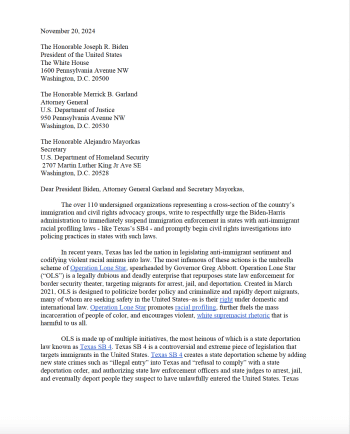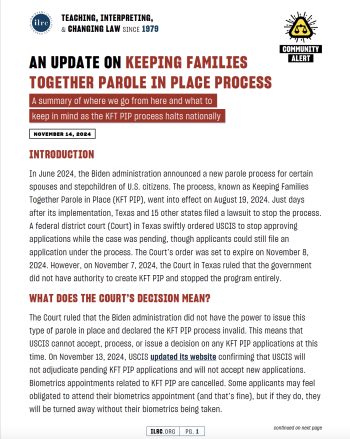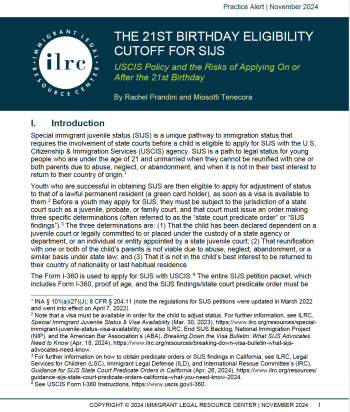This downloadable and printable toolkit is divided into different sections that give guidance on family preparedness planning, regardless of immigration status. It gives additional advice to undocumented and/or mixed status families.
Under current USCIS regulations, any person under 21 years of age who otherwise meets the eligibility requirements may be granted SIJS. This practice alert addresses many of the unsuccessful arguments that USCIS has not accepted when a petition received by USCIS after the youth turns 21. In rare cases, USCIS has accepted petitions received after the petitioner’s 21st birthday when there is proof that the petition was improperly rejected or receipted by USCIS before the deadline. This practice alert primarily focuses on USCIS Administrative Appeals Office (AAO) decisions and limited federal court cases to highlight successful and unsuccessful arguments when the SIJS petition is filed on or after the youth’s 21st birthday.
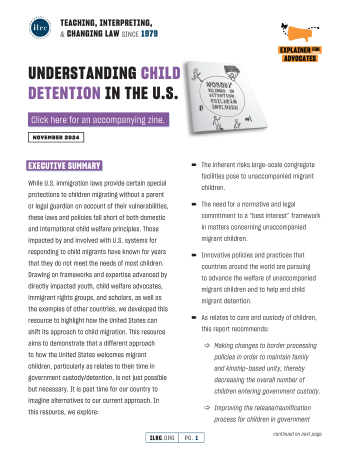
While U.S. immigration laws provide certain special protections to children migrating without a parent or legal guardian on account of their vulnerabilities, these laws and policies fall short of both domestic and international child welfare principles. Those impacted by and involved with U.S. systems for responding to child migrants have known for years that they do not meet the needs of most children. This resource aims to demonstrate that a different approach to how the United States welcomes migrant children, particularly as relates to their time in government custody/detention, is not just possible but necessary.
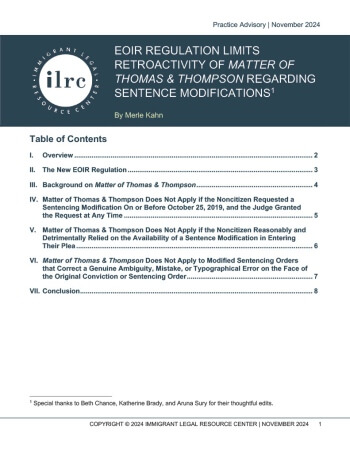
EOIR Regulation Limits Retroactivity of Matter of Thomas & Thompson Regarding Sentence Modifications
On October 25, 2019, the Attorney General published Matter of Thomas & Thompson holding that adjudicators could only recognize a sentence modification for immigration purposes where the sentence was vacated due to procedural or substantive defect as defined in Matter of Pickering. It was not clear whether this holding was retroactive. Under new DOJ regulations it is now clear that Matter of Thomas & Thompson is not retroactive. Adjudicators will recognize a sentence modification as vacating the sentence for immigration purposes where: (1) the person filed for the sentence modification on or before October 25, 2019; (2) the person relied on the availability to seek a sentence modification where the conviction date was on or before October 25, 2019; (3) there was a clerical or typographical error in the sentence regardless of the date of entry of the sentence; or (4) where the sentence was vacated due to a procedural or substantive defect in the sentencing - regardless of when the sentence modification was filed.
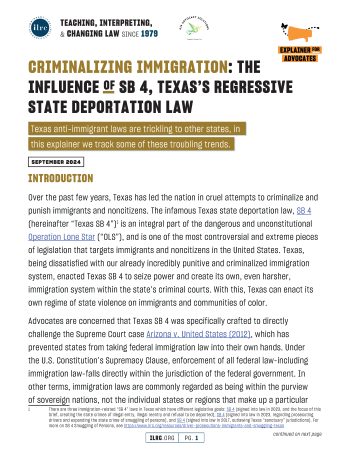
Over the past few years, Texas has led the nation in cruel attempts to criminalize and punish immigrants and noncitizens. The infamous Texas state deportation law, SB 4, is an integral part of the dangerous and unconstitutional Operation Lone Star and is one of the most controversial and extreme pieces of legislation that targets immigrants and noncitizens in the United States. In 2024, state legislatures across the country have proposed bills that further expand the already vast and punishing criminal-legal system by requiring local law enforcement to carry out federal immigration enforcement and creating new crimes that punish the act of crossing into a state without legal status. Unless stopped, Texas SB 4 and its ilk could herald a regressive wave of anti-immigrant state legislation that will endanger noncitizens and U.S. citizens across the country–to a greater extent than occurred in 2010 after the passage of Arizona’s infamous racial profiling law, SB 1070. This report looks at the copycat policies being put forth across the country.
